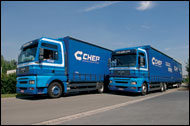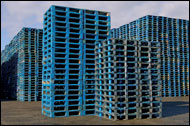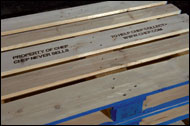 CHEP, the global leader in pallet and container pooling services, serves many of the world’s largest companies and issues, collects and reissues over 300 million pallets and containers through its global network of service centres, helping manufacturers and growers transport their products to distributors and retailers. CHEP recently reorganised its European business to better meet its growth needs and decentralised some core functions to provide a country focus. At the same time it has put programmes in place to highlight its role in helping clients meet their environmental obligations and make sure it is recognised as ‘Easy to Do Business With.’ Warehouse & Logistics News spoke to Mike Pooley, recently appointed CHEP Vice President Country General Manager to the UK and Ireland.
CHEP, the global leader in pallet and container pooling services, serves many of the world’s largest companies and issues, collects and reissues over 300 million pallets and containers through its global network of service centres, helping manufacturers and growers transport their products to distributors and retailers. CHEP recently reorganised its European business to better meet its growth needs and decentralised some core functions to provide a country focus. At the same time it has put programmes in place to highlight its role in helping clients meet their environmental obligations and make sure it is recognised as ‘Easy to Do Business With.’ Warehouse & Logistics News spoke to Mike Pooley, recently appointed CHEP Vice President Country General Manager to the UK and Ireland.
WLN – When did you (Mike) come into your present job, and what were you doing before?
I was appointed in July 2008; before that, I was responsible for CHEP’s key European customer accounts.
WLN – What are your main objectives in your new role?
My main objective is to continue to grow the UK business and deliver improved service and customer satisfaction to our existing customers.
WLN – When was CHEP founded, and who by?
CHEP has been in business since 1945. It was established by the Australian Government to collect materials left at military bases by the US Army. Known in its formative years as the Commonwealth Handling Equipment Pool, since privatisation we’ve grown into a global business, becoming established in the UK in 1975.
WLN – Who owns CHEP now?
CHEP is now owned by Brambles, a leading global provider of support services, operating in 45 countries and employing over 12,000 people. The group also owns Recall, the information management company.
WLN – How big is CHEP in worldwide turnover and staff numbers?
Worldwide, CHEP employs over 7,000 people in 45 countries. CHEP performed strongly in the 2007 Financial Year, with sales and profit growth in all regions. Revenue was $3.2 billion and operating profit was up 17%. Results for FY08 will be released at the end of August, after this goes to print.
WLN – Which parts of the world do you see your major opportunities in?
We are already making inroads in India and China, and there are also significant growth opportunities in Europe, particularly in Germany and Poland.
WLN – When was CHEP set up in the UK and Ireland? How big is it here in turnover, staff and depots?
CHEP’s UK operation was established in 1975. We’ve grown to 15 service centres in the UK and Ireland and have over 1,800 employees here.
WLN – What size companies are your customers?
Our customer profile is very broad – our global capability means we’re well placed to serve the biggest names in the manufacturing industry such as Kellogg’s, Nestlé, Procter & Gamble and Ford, to name a few. We also work with many household names in distribution such as ASDA and B&Q. However, we also serve small family businesses moving just a few hundred pallets per year. Quality and customer service are important to all of them, and they’re two key drivers for CHEP to ensure we keep our customers happy.
WLN – How is CHEP doing in the UK?
I’d say the UK is a mature market with respect to pallet pooling, but our UK business still has some significant targets for growth and expansion of business for existing clients, as well as continuing to offer excellent quality and service.
WLN – How do you plan to achieve this growth?
We are aiming to continue to grow our business through focusing heavily on customer satisfaction and quality. In addition we will start to look at opportunities outside the market sectors we have traditionally served.
 WLN – What industry sectors are your UK and Ireland clients in?
WLN – What industry sectors are your UK and Ireland clients in?
CHEP handles pallet and container supply chain logistics for customers in the consumer goods, produce, meat, home improvement, beverage, raw materials, petrochemical and automotive industries.
WLN – Which is your biggest single sector? Which of these sectors is growing fastest in the UK?
Our biggest sector is FMCG with manufacturers and growers sending their products directly to distributors. Fresh produce and household goods is a big and highly visible area. We’re seeing an increase in display pallets for merchandising. We also have opportunities in the building and DIY trade which we’re excited about.
WLN – Are you seeing any signs of a downturn in the UK economy? How is it affecting your marketplace?
Of course we’re being hit by the rise in fuel costs, but we’re an innovative business, so we’ve looked hard at how we can reduce the need for transportation by optimising the existing distribution networks, often in collaboration with our customers, to avoid what we call “empty running” – we always endeavour to ensure our vehicles have a full, or nearly full, load to minimise road miles.
In other areas, my colleagues in procurement are highly professional and our size, scale and forward planning mean we are able to absorb some of the costs, particularly rising timber costs.
WLN – What kind of pallets and containers do you supply? Do you supply heat-treated timber pallets for export? Do you supply plastic pallets?
We do supply ISPM 15-compliant, phyto-sanitary heat-treated pallets for export to the US, Canada, the Middle East region and South Africa. CHEP’s extensive product range has developed beyond the standard wooden pallet to meet customer demands, however by far our most widely used product is our 1200×1000 mm wooden pallet. We’re also seeing growth in our reusable plastic containers (RPCs), which are popular with fresh produce, meat and fish and non-perishable goods in supermarkets. The automotive industry has offered new opportunities, and we’re seeing expansion for containers in this area. We also offer a number of different products, including plastic display pallets and intermediate bulk containers (IBC’s).
WLN – How can people tell your pallets apart from other companies’ pallets?
Well, it goes without saying that blue is the colour of the standard CHEP pallet. It’s quite distinctive, and after reading this you’ll struggle not to spot them in supermarkets – even when you don’t intend to! Our pallets are also branded with the white CHEP logo, and in addition we are increasingly embossing an ownership statement into the top boards of new pallets.
WLN – Pallets are assets with a cash value. Are your pallets security-tagged in any way?
Our pallets are indeed a valuable asset, and we take good care to recover any stray or mis-used pallets through a dedicated network of Asset Management people. CHEP is a leader in RFID, and for some customers we offer RFID-enabled pallets and containers with best-in-class support applications to collect, store and process data.
 WLN – Do you manufacture any of your pallets or containers yourselves?
WLN – Do you manufacture any of your pallets or containers yourselves?
Pallet manufacture is not our business. However we have 15 strategically placed service centres across the UK and Ireland, tasked with the collection, repair, and reconditioning of over 80 million pallets and containers every year. The life cycle of a CHEP pallet can be over 10 years, and through very carefully planned maintenance we’ve been able to dramatically reduce the number of ‘bought in’ pallets by simply reconditioning and replacing pallet components.
The advantages are threefold: we keep costs down, we get the pallet back into the pool quickly, and the impact on the environment is lessened by the reduced need for new wood.
WLN – What effect have increased global timber prices had on your business?
As a commodity, timber prices fluctuate dramatically, however we have seen recent stabilisation. The benefits of a strong supplier network and long-term partnerships, combined with our global buying power have meant we’ve managed rising costs better than others. The very nature of our business means we always look to reuse and recycle, only purchasing new when absolutely necessary.
WLN – I understand you recently reorganised your European business to better meet its growth needs and decentralised some core functions to provide a country focus. Can you tell us about that? What has changed in the UK as a result? What are the benefits for the customer?
Our sales organisation was previously centrally managed, along with operations, logistics and some other support functions. We will retain the functional structure for operations and logistics because the scale and continuity of these functions across our European network continues to drive significant performance improvements. However, the country businesses will now be responsible for their sales growth and overall profitability. This will empower the country teams to make decisions more quickly and add a degree of flexibility in the way we respond to the needs of our customers in different regions.
WLN – You recently announced a marketing initiative highlighting your environmental credentials and the benefits of pallet pools in helping companies become greener. Can you tell us about that?
Yes. We’ve always been confident that our pallet pooling system, where equipment is continually circulating throughout the supply chain, delivers significant environmental benefits compared with the returnable white wood or the disposable pallet alternatives. To prove this, we’ve worked recently with Leeds University to develop a comprehensive model that calculates the savings over a ten-year period. So now we can quantify the benefits to our customers in terms of the number of trees saved from being cut down and the reduction of CO2 in the atmosphere.
 WLN – For the uninitiated, what are the key points regarding the environmental benefits of using a pallet pool?
WLN – For the uninitiated, what are the key points regarding the environmental benefits of using a pallet pool?
If you’re in the industry, you will know all about the European Packaging and Packaging Waste Directive, which focuses on five areas: prevention of packaging waste, reuse of packaging, and the repair, recovery and re-cycling of packaging waste. There are some serious targets set for businesses in the EU. What’s quite obvious about CHEP is that we operate a very efficient pallet pooling system, governed by these five areas. We work hard to limit the amount of waste we generate, and ensure that any we do is recycled.
To help you visualise this, if you consider CHEP’s European operation over a 10-year period, assuming a growth rate of 10% per year, we will save more than 242 million trees from being felled, compared with one-way disposable pallets. This represents an area of 8,500 km2, equivalent to the Canary Islands.
WLN – I gather you also have a Europe-wide programme in place to make sure CHEP is recognised as ‘Easier to Do Business With.’ What is that about?
We’re keen to listen to customers, so we’ve taken action on the feedback from our annual customer satisfaction survey. The ‘Easier to Do Business With’ programme involves a number of practical measures, including e-enabling much of our invoice-to-payment process and simplifying our invoice materials and customer communications.
WLN – How far have you got with implementing that?
A significant number of European customers have already opted for an electronic invoice, and we’re adding a digital signature to this in the autumn. We’ve already begun the roll out of customer support tools to allow better analysis of invoice documentation with our invoice reconciliation tool TransMatch. We’re already seeing a reduction in customer time spent on the invoice-to-payment process from several days to just a few hours. And that’s got to be a good thing!
WLN – To what extent can customers order pallets and manage their account on line?
Again, we’ve invested heavily in our on-line customer portal “Portfolio+PLUS” where customers can log in to their account, view their profile, transactions, request collections and generally be up-to-speed on their working relationship with CHEP. There are still some improvements to come, and we’re working with customers to make sure we can offer what they need.
WLN – I understand you also have a service called Managed Recovery. What does that entail?
Managed Recovery is an enhancement to our CHEP exchange offer, whereby we undertake the return of trade quality pallets in full truck loads to the manufacturer or grower’s sending location. The benefits include vehicle optimisation through reduced empty running and logistics synergies and a reduction in paperwork. These added value services are key to ensuring greater efficiencies in the pallet pool, and bring us closer to our customers.
WLN – What packaging waste regulations do your pallets comply with?
Our pallet pooling services comply 100% with European Packaging & Waste Directive 94/62/EC and the “five step waste hierarchy” framework I mentioned before, which is part of our Environmental Charter. We ensure the longest “lifecycle” for our pallets: we limit our use of natural resources to a minimum and achieve the highest possible re-use. We strive to recover all our equipment: we never dispose of pallets, and recycle 100% of all damaged pallets.
WLN – What are the steps to opening an account with CHEP? How long does it take? What is the minimum number of pallets a client needs to order from you over what period to open an account?
Prospective customers are encouraged to contact our New Business Team on 0800 73 74 75 or newbusiness.uk@chep.com. At this stage one of our Sales Executives records the customer’s requirements and arranges a visit from one of our field-based Business Development Managers, if required. We welcome enquiries of any nature or volume.
Once we’ve established requirements, a Hire Agreement is issued to the customer. After the signed contract is returned our data teams open the account and equipment is available for use within 48 hours. The whole process typically takes around 7-14 days from start to finish.
 WLN – What do you see as the biggest external factors that are likely to impact on your business here and in Europe?
WLN – What do you see as the biggest external factors that are likely to impact on your business here and in Europe?
As I mentioned before, the current uncertainty in oil prices and the increasing emphasis on our responsibility to the environment are going to play a major part in how we shape our business in the future. We are also seeing a continued evolution in our customers’ supply chains as manufacturers and retailers look for better ways to bring products to shelf or display. These changes provide CHEP with some challenging but very exciting opportunities.
WLN – Finally, where do you see CHEP in the UK and Ireland going from here?
I believe we are in a very strong position to accelerate the growth in our business. I want to see our existing customers continuing to get great value from working with CHEP. I also want us to explore opportunities in new market sectors and continue to innovate in new products and service offers.
CHEP UK & Ireland
Tel: 0800 73 74 75
www.chep.com




3 Comments
How does CHEP’s ABC Model works?
Hello
We at our factory have about 30 to 40 of your pallets. We would very much like them uplifted but the drivers that deliver them to us won,t take them. Could you help us. Contact R N Law factory manager @ J Gimour & Co Ltd, Penston Rd, Macmerry, East loithan, Eh 33 2 aj.
I notice that your pallet stacks are 25 high, do you have any guidance on how to store your pallets including fire breaks etc in a yard?